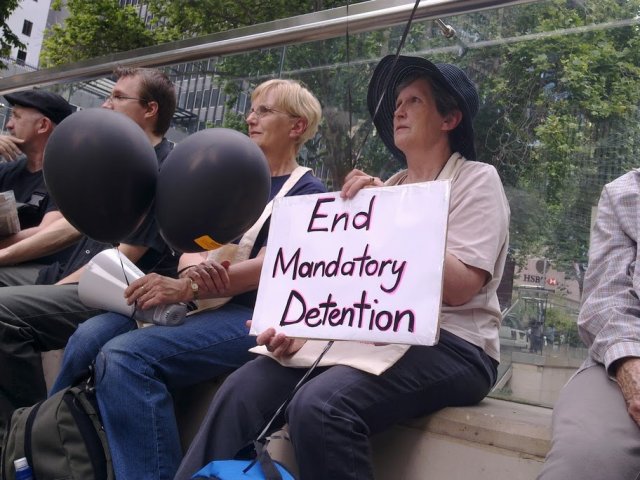
Prime Minister Julia Gillard used a series of meetings with Asian leaders at the UN Regional Summit on October 30 to lobby for her government’s proposal to build a “regional” detention centre for refugees in East Timor.
She met with Vietnamese President Nguyen Minh Triet, Indian Prime Minister Manmohan Singh, Prime Minister Bouasone Bouphavanh of Laos and President Benigno Aquino of the Philippines, the October 30 Australian reported. She also met with United Nations secretary general Ban Ki-Moon, who “noted” her proposal — the only outcome reported.
She fared little better the next day when she visited Malaysia for talks with deputy PM Muhyiddin Yassin, who was non-committal. “A lot more needs to be done”, he told ABC radio’s PM on November 1. “We need to see how this mechanism can work and whether the respective parties involved will need to be contributing in any way to the cost of the centres.
“So there are a few outstanding matters that need to be addressed before Malaysia states its sort of official position in this.”
Gillard then visited Indonesian President Susilo Bambang Yudhoyono on November 2, and again the response to her East Timor detention centre plan was underwhelming.
ABC Radio Australia reported Indonesian foreign affairs spokesperson Teuku Faizasyah said: “There are certain opinions evolving in Indonesia as it was devolved in other parts of the region, the potential (of the plan) to be a pull factor.”
Meanwhile, a deal has come to light whereby the number of refugees currently in Indonesia that Australia would give residency to would increase. However, Australia has resettled only 10% of the refugees it said it would take.
The ABC reported on November 2: “The deal was revealed by the UN High Commissioner for Refugees (UNHCR) in Jakarta just before the federal election. But the agency says to date it has recommended 528 confirmed refugees for resettlement and so far just 52 have gone to Australia.”
“The new yearly commitment is equal to the total number of refugees resettled in Australia from Indonesia between 2001 and 2009. If Australia meets its target this year it would take well over half the number of confirmed refugees currently living in Indonesia.”
Of the 3200 people registered with the UNHCR in Jakarta, so far 850 have had their refugee status confirmed.
Kadija, an Afghan refugee, told the ABC she wanted refuge somewhere, but was not set on Australia. Her family of four fled Afghanistan 10 years ago, ending up in Malaysia. After waiting for years to be resettled, they attempted to journey to Australia.
They paid a people smuggler US$2000 a head to get to Indonesia, but after the crew demanded more money and threatened their lives, their children were too frightened to continue.
Indonesian Institute of Sciences researcher Dr Tri Nuke described Gillard's proposal as "reckless". She told New Matilda on November 3 that Indonesia was concerned about the impact the proposed centre could have on relations with East Timor.
She added that besides asylum seekers from other countries, Indonesia also had many internally displaced people as a result of natural disasters. The October 25 eruption Mount Merapi displaced 69,000 people.
About 2000 refugees are detained in Indonesia, including babies and unaccompanied minors.
For more information on the conditions that asylum seekers in Indonesian detention endure read lawyer Jesse Taylor’s report Behind Australian Doors.

Comments
Rizwan replied on Permalink